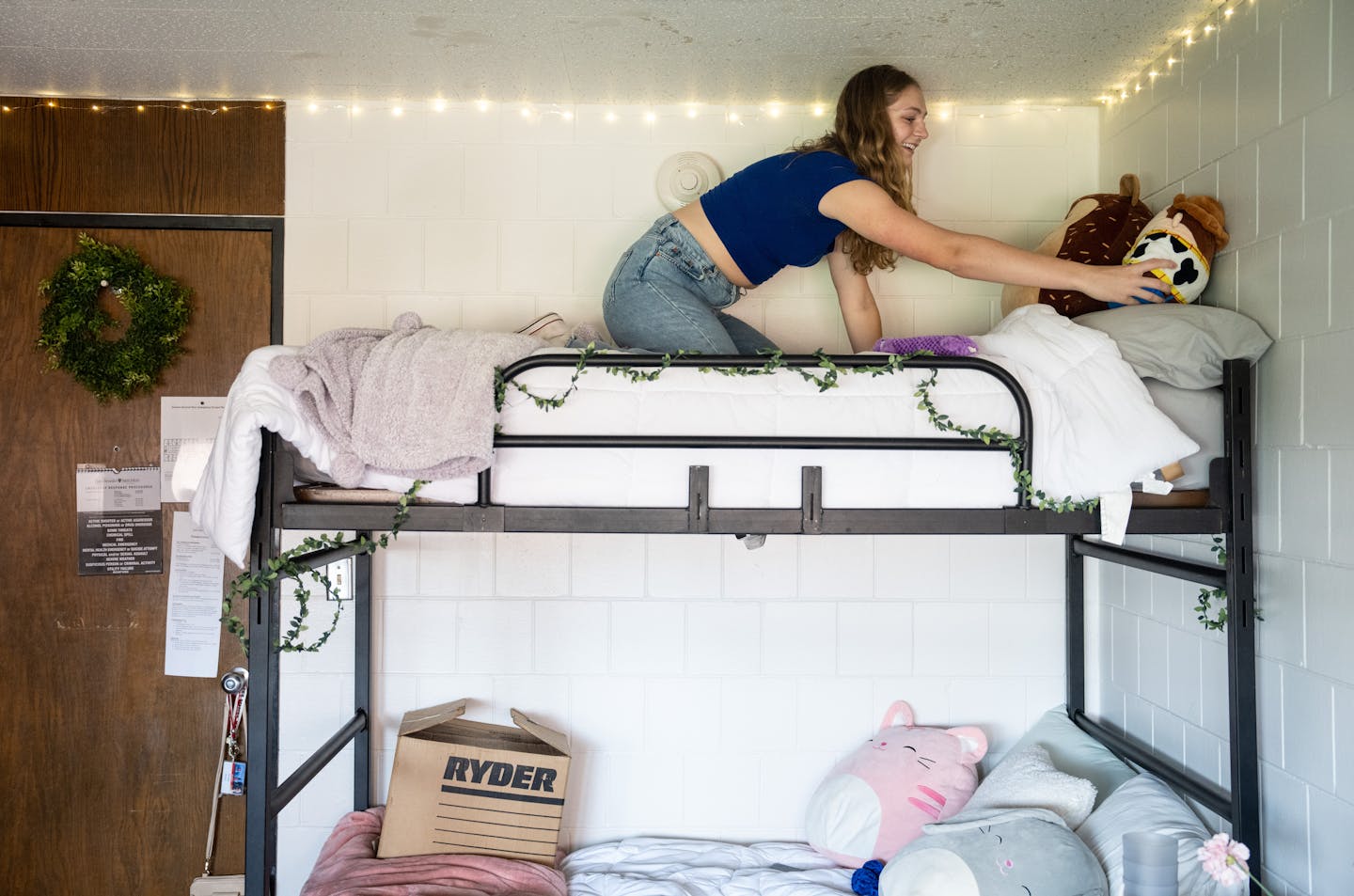
Their predicament was so heartbreaking, so absurd, that Emily and Courtney Goude coped the only way they could.
The twin sisters had squished the contents of their entire lives into garbage bags. They were lugging their stuff out of Courtney's rusty PT Cruiser, about to crash at a friend's place, because an altercation with their mother left them with no place to sleep in the middle of a Minnesota winter.
As they gathered their plastic sacks, the sisters' eyes locked. That's when they lost it.
"We just could not stop laughing," Courtney recalls.
"If you told this to a friend, they would say, 'This isn't funny. This is sad,'" Emily says.
But it lightened their suffering, if just for a minute, to joke about their situation: homeless together at 17.
The Goude twins have always been a rock for each other, and they're counting on that bond, and a tiny posse of supporters, to propel them through the next four years.
They started school Monday, just months after they became homeless, as first-year students at the College of St. Benedict in St. Joseph, Minn. They are best friends — and now, college roommates.

Renée Jones Schneider, Star Tribune, Star Tribune
The start of the school year always carries the whiff of possibility. Those bound for university life can find their friends, pursue intellectual curiosity and learn who they are. But for Emily and Courtney, it represents something so promising that you almost ache for it. It's a bridge to a future with avenues they haven't even imagined for themselves.
"I know I'm going to spread my wings into the person I've always wanted to be," Emily said, just minutes after getting out of her first class on Monday. "I'm excited to meet new people and create a new life for myself."
If they can pull off a four-year degree, "that would be huge," Courtney said, "because no one in our family has graduated from college."
When they were born, Emily came out first, 25 minutes before Courtney. Today they are both athletic, at 5 feet 11, and wear their hair in long beachy waves. They are identical twins, with identical voices (my transcription software can vouch for that), but they point out to me that Courtney has a nose ring; Emily bleaches her hair a lighter blond.
Now in a dorm room decorated with holiday lights and selfies with friends, Emily's eyes start to tear up. "I'm probably going to cry a lot," she explains from her bunk bed. Courtney pats her on the knee.
They don't talk about this often.
"We have a very special bond," Emily says. "As much as someone can hear about what we've been through the last eight months, the only person who will ever really know completely is Courtney."
"Stuff has been happening even before January," says Courtney.
"Literally our whole lives," says Emily.
Their dad left them when they were young, and their relationship with their mom had become toxic. Chaos in their Spring Lake Park home meant it was hard to focus on school. Emily was depressed, even suicidal. The sisters were already planning to move out, when on the night of Jan. 14, things escalated. It ended with them locked out of the house, and a threat to throw out all of their stuff if they didn't pick it up the next day. (I was hoping to have a chance to talk to their mom, but she didn't return my calls.)

Provided, Star Tribune
The next morning the sisters called Kelly Jo McDonnell, a mom they had befriended when Courtney was dating her son, Hayden. McDonnell heard them sobbing on the phone and told them to grab their things and come to her house.
When McDonnell got home from work that day, she found the girls in the spare bedroom of her basement. She says she can't forget the sight.
"They looked like they were 12," she said. "All you could see was their little eyes. They were holding their stuffed animals in front of them like a blanket."
"I'm not a social worker, I don't know this stuff," she said. "But I'm a mom, and I know when I see a scared kid."
Emily and Courtney were afraid of going into foster care and being separated, or having to stay at a shelter with strangers. For a while they lived with a grandma, but that didn't work out. The school social worker said the youth shelters were full.
McDonnell, who grew up in small-town Iowa and still carries a disarming, take-charge sunniness, helped come up with a game plan for the girls: They'd split their time with her and with McDonnell's brother and sister-in-law in Andover, who lived closer to the girls' high school in Spring Lake Park, until they could graduate in the spring.

Gretchen Tieu, Star Tribune
"They're good girls, they have good heads on their shoulders. We've come to love them," said McDonnell, who lives in Minnetonka with her husband. "We didn't like the road that was put in front of them. If I can help them to an easier road, I will do it."
But McDonnell would soon learn how the system is not equipped to take on kids like Emily and Courtney. Although they had been working all throughout high school, they were still months shy of turning 18. They could not lease an apartment, let alone set up their own bank accounts. McDonnell acted as a go-between with the girls' mom to access copies of their birth certificates and Social Security cards. "We were building their lives from the ground up," she said.
Least visible, most vulnerable
Young people couch-hopping or living in cars and shelters represent a nearly invisible population. Roughly 13,300 youth in Minnesota who are on their own experience homelessness over the course of a year, according to a 2018 study by the Wilder Foundation. That figure includes about 5,800 unaccompanied kids who are 17 and under. Black, Indigenous and LGBTQ kids are disproportionately affected.
While younger children might find themselves in foster care, teens often have unique needs.
"There's definitely not a lot of attention paid to older kids," said Rich Gehrman, executive director of the nonprofit Safe Passage for Children of Minnesota, which advocates for improvements to the child welfare system.
Parents aren't legally allowed to kick out their children, but it happens, and it's often unreported. Even if foster care finds homes for the youth, by that point, "the damage is sort of done, they've been through hell," Gehrman said. "A lot of kids in that situation have a lot of trauma they're dealing with, not just from the moment they get expelled from the house, but everything leading up to it."
McDonnell and her sister-in-law promised to keep the Goude girls safe. With McDonnell's support, the girls finished their homework and applied for college. Other caring adults popped into their lives, like a creative writing teacher who tracked them down to make sure they turned in missing papers so she could pass them.
"They started to miss a lot of class," recalled the teacher, Jenn Prince, who had heard only bits and pieces of their story. "There was some avoidance. They felt like they didn't want to let people down. They were good students and wanted to do very well."

Renée Jones Schneider, Star Tribune, Star Tribune
But they graduated — even weeks early — and give much of the credit to McDonnell, who showed up to watch them cross the stage.
"They say it's thanks to me, but I say, 'No, it's thanks to you,' " McDonnell said. "I put you in front of the right road, but you still have to keep walking it."
Emily and Courtney moved to St. Joseph in June on their 18th birthday. They've been working their jobs on campus nearly every day. The cost of attending the school amounts to more than $60,000 a year, but after financial aid, loans and work-study, they estimate they should pay only a few hundred dollars a year.
Strangers are also working to lighten the girls' load. It started with McDonnell connecting them with Julie Gravgaard, who coordinates the St. Joe's community food shelf. Soon Gravgaard was raising money from her local Lions club for scholarships, offering to buy the girls' books and sharing their story with business owners and neighbors who ponied up cash and gift cards.
Gravgaard told me she realized the kids needed more than food. "They needed someone to say, 'Here I am. I am in your corner.' "
"This feels more like home than home has ever felt," Courtney told me. "The people in this town care so much."

Renée Jones Schneider, Star Tribune, Star Tribune
Courtney and Emily say they'll take advantage of every opportunity on campus that comes their way, from free tutoring to therapy. Courtney thinks she'd like to be a social worker. Emily plans to major in psychology. By opening up about their hardships, they also hope they can signal to other young people who are hiding a secret that they're not alone.
In the distance, they also have dreams that hit closer to home. "If I have kids, I'm going to give them the world," Emily says.
"I just want to break the cycle. We already are breaking the cycle," Courtney says.
With her sister at her side, she remarks on their good luck.
"Every step that we've taken," she says, "is together."